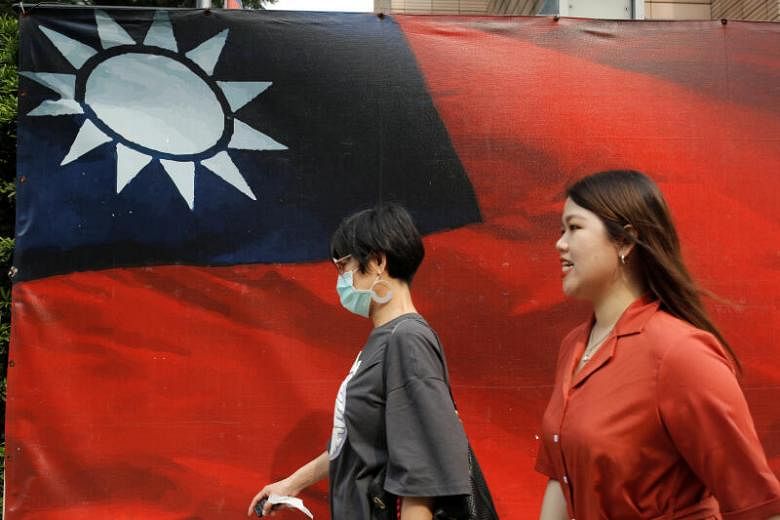TAIPEI/WASHINGTON (REUTERS, BLOOMBERG) - Taiwan unveiled a NT$42.1 billion (S$1.9 billion) increase for next year's planned defence spending on Thursday (Aug 13), as China announced details of its latest combat drills near the democratic island.
China has stepped up its military activity near Taiwan. On Monday, Taiwan said Chinese fighters briefly crossed the sensitive median line of the Taiwan Strait, the same day that US Health Secretary Alex Azar met President Tsai Ing- wen in Taipei.
China had denounced Mr Azar's trip.
President Tsai's Cabinet is proposing NT$453.4 billion in military spending for the year starting in January, versus NT$411.3 billion budgeted for this year, up 10.2 per cent, according to Reuters calculations.
About three hours after the budget announcement, China's People's Liberation Army's Eastern Theatre Command said its forces had in recent days carried out combat drills in the Taiwan Strait and to the north and south of the island, implying they were aimed at Mr Azar's trip.
"Recently, a certain large country has continued to make negative moves on Taiwan-related issues, sending seriously wrong signals to 'Taiwan independence' forces, and seriously threatening the peace and stability of the Taiwan Strait," it said.
"The theatre command's organising of patrols and exercises are necessary actions taken in response to the current security situation across the Taiwan Strait and to safeguard national sovereignty," the statement added.
Ms Tsai has made modernising Taiwan's armed forces and increasing defence spending a priority.
The budget must be approved by lawmakers, though Ms Tsai's Democratic Progressive Party has a large majority in the legislature, making it unlikely to be blocked.
China has never renounced the use of force to bring Taiwan under its control, and has denounced the United States for arms sales to the island. Washington is bound by law to provide Taiwan with the means to defend itself.
Taiwan is in discussions with the US to acquire sea mines to deter amphibious landings as well as cruise missiles for coastal defence, Taiwan's de facto ambassador to United States said on Wednesday.
Speaking to the Washington's Hudson Institute think tank during an online event, Ms Hsiao Bi-khim said Taiwan was facing "an existential survival issue", given China's territorial and sovereignty claims over the island and needed to expand its asymmetric capabilities.
"What we mean by asymmetric capabilities is cost effective, but lethal enough to become deterrence - to make any consideration of an invasion very painful," she said.
Ms Hsiao said Taipei is currently working with the US on acquiring a number of hardware capabilities, including cruise missiles that would work in conjunction with Taiwan's indigenous Hsiung Feng missile system to provide better coastal defence.
Other systems under discussion included "underwater sea mines and other capabilities to deter amphibious landing, or immediate attack", she said.
Ms Hsiao said Taiwan also wanted to strengthen defences on islands it controls in the South China Sea, which Beijing claims almost in its entirety.
"For Taiwan, our priority in our survival involves building up the defence of Taiwan itself, but also of the islands that Taiwan currently controls in the South China Sea," she said.
Last year, the US State Department approved arms sales worth US$10 billion (S$14 billion) for Taiwan, including 106 M1A2 Abrams tanks and 66 F-16V fighter jets.
Taiwan's military is well armed, but dwarfed by that of China's, which is adding advanced equipment like stealthy fighter jets and aircraft carriers.
At the same online event, Ms Tsai called on the international community to speak out against Beijing.
"Our 23 million people have the right to determine our own futures, which is the antithesis of the approach Beijing has taken," Ms Tsai said.
She praised the US and the United Kingdom for criticizing China's actions, while calling on more nations to do so.
Ms Tsai's remarks on Wednesday come days after Mr Azar travelled to the island, the most senior visit by an American official in more than four decades.
Although she reiterated her willingness to talk with Beijing on the basis of "peace, parity, prosperity, and dialogue", she said the island should be capable of defending itself.

